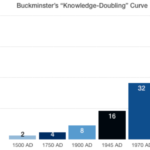Human Knowledge now doubles twice a day.
Why School?—March, 2019
published by: https://raymondk12.org/why-school-march-2019/
According to Wikipedia, “A school is an educational institution designed to provide learning spaces and learning environments for the teaching of students under the direction of teachers. Most countries have systems of formal education, which is commonly compulsory.”
Why?
I am not trying to be a smart aleck. Like most Americans, my gut reaction to the question “What is the purpose of school?” would be something similar to “To prepare them for the rest of their life.” However, in a world that is changing so quickly, is that even possible? I recently read that Buckminster Fuller created a “knowledge-doubling curve” to show how fast the amount of knowledge in the world doubles. It is shown below:
In other words, the knowledge available to humankind in 1985 was 64 times what was available in 1 AD. Please note that time to double has shortened dramatically; from 1500 years, to 250 years, to 150 years, etc. This is what is known as an “exponential trajectory.” Since this chart was first published, IBM has estimated that in 2001, knowledge was doubling every 1-2 years. Currently, they estimate knowledge doubles every 11-12 hours. With the increasing “internet of things”, big data and the continued advancement of science, we are assured we will be continuing on this path.

Knowledge Half-life
At the same, the half-life of much knowledge is decreasing at an exponential rate. What does that mean? This term refers to the amount of time it takes for knowledge to lose half of its value; in other words, what we knew to be true is either no longer true or out-dated. Science, technology, research and development, marketing, etc. are all short “half-life” fields. Information that 10 years ago was useful for 12 months, might only be valuable for 6 months today.
Knowledge Tsunami
The message is very clear: if knowledge is doubling exponentially and the half-life of much knowledge is decreasing significantly, we should expect a “knowledge tsunami” and an “undertow” of outdate knowledge clutter that can weigh us down.
For schools, this means being selective in what we teach, teaching timeless knowledge and focusing on how to find knowledge, rather than simply trying to “cram it in.” For society, it may mean adjusting how we think schools should be designed and what outcomes they should seek.
References:
http://bit.ly/2HhchgO
http://bit.ly/2ENrUem
http://bit.ly/2TyrhNP